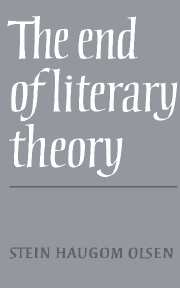Book contents
- Frontmatter
- Contents
- Preface
- Literary aesthetics and literary practice
- Interpretation and intention
- Authorial intention
- Text and meaning
- The ‘meaning’ of a literary work
- Defining a literary work
- What is poetics?
- On unilluminating criticism
- Criticism and appreciation
- Value-judgements in criticism
- Literature, fiction, and reality. A problematic relationship
- Thematic concepts: where philosophy meets literature
- Literary theory and literary aesthetics
- Notes
- Bibliography
- Index
What is poetics?
Published online by Cambridge University Press: 05 November 2011
- Frontmatter
- Contents
- Preface
- Literary aesthetics and literary practice
- Interpretation and intention
- Authorial intention
- Text and meaning
- The ‘meaning’ of a literary work
- Defining a literary work
- What is poetics?
- On unilluminating criticism
- Criticism and appreciation
- Value-judgements in criticism
- Literature, fiction, and reality. A problematic relationship
- Thematic concepts: where philosophy meets literature
- Literary theory and literary aesthetics
- Notes
- Bibliography
- Index
Summary
ONE
The conception of poetics as an objective and systematic, or, indeed, even a ‘scientific’ study of literature has gained wide currency among theorists and critics since the last war. Primarily this has been due to the influence of the ‘semantic’ poetics which followed upon the New Criticism, but more recently the structuralist poetics in France has developed similar ideas. Structuralism and semantic poetics do indeed draw their ideas from very different sources, but they share a common assumption which may be called the axiom of objectivity. This assumption can be formulated roughly as follows: the literary work is a piece of discourse (a text) possessing certain characteristics which make it what it is: a literary work. As a piece of discourse it is accessible to all the speakers of the language; its qualities can be observed and classified by interested observers, and if, in a particular case, there is dispute about what these qualities are, it can be settled by reference to the text itself. Thus a systematic (the structuralists say ‘scientific’) study of literary works is possible; a study which will ultimately lead to a full understanding of the qualities which make a text into a literary work. The text is accorded an object-like status. In the semantic theory it is labelled ‘artifact’. In scientific (structuralist) poetics, texts are ‘phenomena’ to be studied scientifically.
- Type
- Chapter
- Information
- The End of Literary Theory , pp. 88 - 103Publisher: Cambridge University PressPrint publication year: 1987



